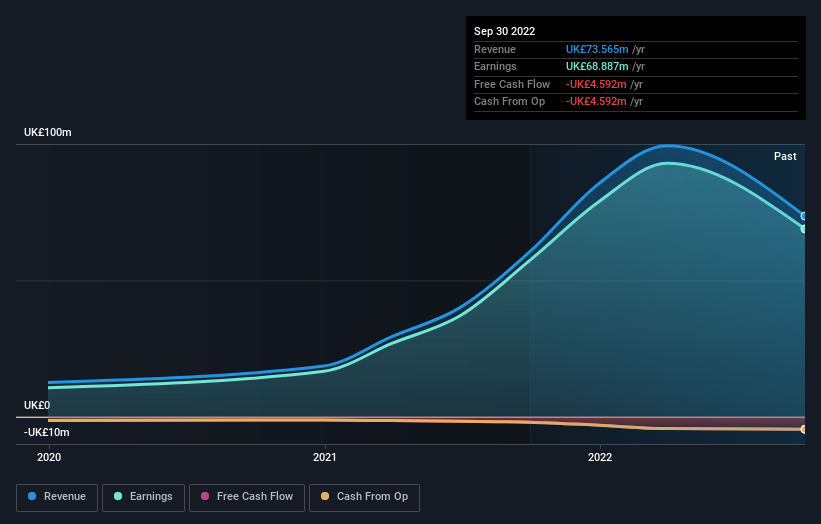With 69% ownership, Literacy Capital plc (LON:BOOK) insiders have a lot at stake
Every investor in Literacy Capital plc (LON:BOOK) should be aware of the most powerful shareholder groups. We can see that individual insiders own the lion's share in the company with 69% ownership. In other words, the group stands to gain the most (or lose the most) from their investment into the company.
So it follows, every decision made by insiders of Literacy Capital regarding the company's future would be crucial to them.
Let's delve deeper into each type of owner of Literacy Capital, beginning with the chart below.
View our latest analysis for Literacy Capital
What Does The Institutional Ownership Tell Us About Literacy Capital?
Institutional investors commonly compare their own returns to the returns of a commonly followed index. So they generally do consider buying larger companies that are included in the relevant benchmark index.
Literacy Capital already has institutions on the share registry. Indeed, they own a respectable stake in the company. This implies the analysts working for those institutions have looked at the stock and they like it. But just like anyone else, they could be wrong. It is not uncommon to see a big share price drop if two large institutional investors try to sell out of a stock at the same time. So it is worth checking the past earnings trajectory of Literacy Capital, (below). Of course, keep in mind that there are other factors to consider, too.
Hedge funds don't have many shares in Literacy Capital. Our data suggests that Paul R. Pindar, who is also the company's Top Key Executive, holds the most number of shares at 28%. When an insider holds a sizeable amount of a company's stock, investors consider it as a positive sign because it suggests that insiders are willing to have their wealth tied up in the future of the company. Meanwhile, the second and third largest shareholders, hold 11% and 7.3%, of the shares outstanding, respectively. Interestingly, the second-largest shareholder, Richard Pindar is also Chief Executive Officer, again, pointing towards strong insider ownership amongst the company's top shareholders.
To make our study more interesting, we found that the top 4 shareholders control more than half of the company which implies that this group has considerable sway over the company's decision-making.
While it makes sense to study institutional ownership data for a company, it also makes sense to study analyst sentiments to know which way the wind is blowing. Our information suggests that there isn't any analyst coverage of the stock, so it is probably little known.
Insider Ownership Of Literacy Capital
While the precise definition of an insider can be subjective, almost everyone considers board members to be insiders. Company management run the business, but the CEO will answer to the board, even if he or she is a member of it.
Most consider insider ownership a positive because it can indicate the board is well aligned with other shareholders. However, on some occasions too much power is concentrated within this group.
Our most recent data indicates that insiders own the majority of Literacy Capital plc. This means they can collectively make decisions for the company. So they have a UK£161m stake in this UK£233m business. Most would be pleased to see the board is investing alongside them. You may wish todiscover (for free) if they have been buying or selling.
General Public Ownership
With a 10% ownership, the general public, mostly comprising of individual investors, have some degree of sway over Literacy Capital. While this group can't necessarily call the shots, it can certainly have a real influence on how the company is run.
Private Company Ownership
Our data indicates that Private Companies hold 5.0%, of the company's shares. It's hard to draw any conclusions from this fact alone, so its worth looking into who owns those private companies. Sometimes insiders or other related parties have an interest in shares in a public company through a separate private company.
Next Steps:
I find it very interesting to look at who exactly owns a company. But to truly gain insight, we need to consider other information, too. For instance, we've identified 1 warning sign for Literacy Capital that you should be aware of.
Of course this may not be the best stock to buy. So take a peek at this free free list of interesting companies.
NB: Figures in this article are calculated using data from the last twelve months, which refer to the 12-month period ending on the last date of the month the financial statement is dated. This may not be consistent with full year annual report figures.
Have feedback on this article? Concerned about the content? Get in touch with us directly. Alternatively, email editorial-team (at) simplywallst.com.
This article by Simply Wall St is general in nature. We provide commentary based on historical data and analyst forecasts only using an unbiased methodology and our articles are not intended to be financial advice. It does not constitute a recommendation to buy or sell any stock, and does not take account of your objectives, or your financial situation. We aim to bring you long-term focused analysis driven by fundamental data. Note that our analysis may not factor in the latest price-sensitive company announcements or qualitative material. Simply Wall St has no position in any stocks mentioned.
Join A Paid User Research Session
You’ll receive a US$30 Amazon Gift card for 1 hour of your time while helping us build better investing tools for the individual investors like yourself. Sign up here


